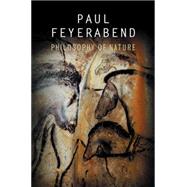
Note: Supplemental materials are not guaranteed with Rental or Used book purchases.
Purchase Benefits
What is included with this book?
Paul Feyerabend (1924-1994) was Professor of Philosophy at the University of California, Berkeley.
An Introduction by Helmut Heit and Eric Oberheim
Editorial Notes
Paul Feyerabend: Philosophy of Nature
Preliminary Note
1. Presuppositions of the Myths, and the Knowledge of their Inventors
1.1. Stone Age Art and Knowledge of Nature
1.2. Megalithic Astronomy (Stonehenge)
1.3. Critique of Primitivist Interpretations of the Prehistoric Era
1.4. The Dynamic Worldview of Stone Age Humans
2. The Structure and Function of Myths
2.1. Theories of Myth
2.2. The Theory of Nature Myths and Structuralism
3. Homer’s Aggregate Universe
3.1. The Paratactic World of Archaic Art
3.2. Worldview and Knowledge in Homer’s Epics
3.3. Views of Reality and the Language of Science: Some Basic Considerations
4. Transition to an Explicitly Conceptual Approach to Nature
4.1. The New World of the Philosophers: Advantages and Disadvantages
4.2. Historical Factors for the Emergence of Philosophy
4.3. Predecessors in Hesiod’s and Oriental Cosmogonies
5. Philosophy of Nature through Parmenides
5.1. Hesiod and Anaximander: Changing Worldviews
5.2. Xenophanes: Critic of Religion and Epistemologist
5.3. Parmenides: The Origins of Western Philosophy of Nature
6. Western Philosophy of Nature from Aristotle to Bohr
6.1. Aristotle’s Research Program
6.2. Descartes: The Mathematical Approach to Nature
6.3. Galileo, Bacon, Agrippa: Empiricism without Foundations
6.4. Hegel: The Dynamics of Concepts
6.5. Newton, Leibniz, Mach: Problems of Mechanism
6.6. Einstein, Bohr, Bohm: Signs of a New Era
7. Conclusion
The New copy of this book will include any supplemental materials advertised. Please check the title of the book to determine if it should include any access cards, study guides, lab manuals, CDs, etc.
The Used, Rental and eBook copies of this book are not guaranteed to include any supplemental materials. Typically, only the book itself is included. This is true even if the title states it includes any access cards, study guides, lab manuals, CDs, etc.